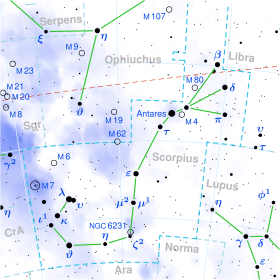Beta Scorpii
| Observation data Epoch J2000.0 Equinox J2000.0 |
|
|---|---|
| Constellation | Scorpius |
| HR 5984 | |
| Right ascension | 16h 05m 26.23198s |
| Declination | –19° 48′ 19.6300″ |
| Apparent magnitude (V) | 2.62 |
| HR 5985 | |
| Right ascension | 16h 05m 26.57128s |
| Declination | –19° 48′ 06.8556″ |
| Apparent magnitude (V) | 4.92 |
| Characteristics | |
| Spectral type | B1V + B2V |
| U−B color index | –0.08 / –0.70 |
| B−V color index | –0.08 / –0.02 |
| Astrometry | |
| HR 5984 | |
| Radial velocity (Rv) | –1.0 km/s |
| Proper motion (μ) |
RA: –5.20 mas/yr Dec.: –24.04 mas/yr |
| Parallax (π) | 8.07 ± 0.78mas |
| Distance | 400 ± 40 ly (120 ± 10 pc) |
| HR 5985 | |
| Radial velocity (Rv) | –3.6 km/s |
| Proper motion (μ) |
RA: –5.07 mas/yr Dec.: –25.87 mas/yr |
| Parallax (π) | 8.19 ± 1.17mas |
| Distance | approx. 400 ly (approx. 120 pc) |
| Details | |
| HR 5984 | |
| Mass | 10 M☉ |
| Radius | 19 R☉ |
| Luminosity | 20,000 L☉ |
| Temperature | 27,000 K |
| Rotational velocity (v sin i) | 100 km/s |
| HR 5985 | |
| Temperature | 22,000 K |
| Rotational velocity (v sin i) | 65 km/s |
| Other designations | |
| Database references | |
| SIMBAD | data |
Beta Scorpii (β Scorpii, abbreviated Beta Sco, β Sco) is a multiple star system in the southern zodiac constellation of Scorpius.
Hierarchy of orbits in the β Scorpii system
Observed through a small telescope, Beta Scorpii appears as a binary star with a separation between the two components of 13.5 arcseconds and a combined apparent magnitude of 2.50. This pair, designated β¹ Scorpii and β² Scorpii, form the top branches of the hierarchy of orbiting components in this system.
β¹ Scorpii, the brighter of the pair, consists of two sub-components, designated β Scorpii A and β Scorpii B, orbiting at an angular separation of 3.9 arcseconds with an orbital period of 610 years. β Scorpii A is itself a spectroscopic binary with the two components, designated β Scorpii Aa (also named Acrab) and β Scorpii Ab, separated by 1.42 milliarcseconds and an orbital period of 6.82 days.
β² Scorpii also has two sub-components, designated β Scorpii C and β Scorpii E, orbiting at an angular separation of 0.1328 arcseconds with an orbital period of 39 years. β Scorpii E in turn is a spectroscopic binary with components designated β Scorpii Ea and β Scorpii Eb and having an orbital period of 10.7 days.
This brings the total number of stars in the system to six. (There is no D component; this is now an artifact of earlier system models.)
β Scorpii (Latinised to Beta Scorpii) is the star's Bayer designation; β¹ and β² Scorpii, those of its two components. The designations of the sub-components - β Scorpii A, Aa, Ab, B, C, E, Ea and Eb - derive from the convention used by the Washington Multiplicity Catalog (WMC) for multiple star systems, and adopted by the International Astronomical Union (IAU).
...
Wikipedia

